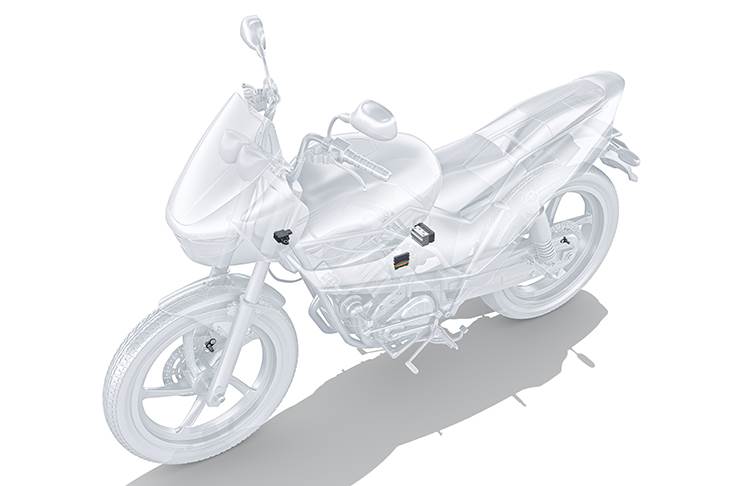Braking or accelerating in bends can be critical to safety when riding a motorcycle and Bosch MSC (Motorcycle Stability Control) helps bikers maintain control in various situations. MSC combines a motorcycle ABS with a 3D or 6D inertial measurement unit (IMU) a is a type of ESP for motorized two-wheelers. The system is now available not only in the mid- and high segments, but it is also finding its way into every motorcycle segment.
In India, TVS Motor Company, the Chennai-based manufacturer of two-wheelers, is fitting its new TVS Apache RTR 310 with Bosch MSC, utilising the Bosch IMU and the ABS 10 base unit, which has a smaller and lighter housing that is suited to motorcycles in emerging markets. That means MSC now covers a wider range of market segments – aiming to make motorcycling safer for everyone.
“Bosch is one of the pioneers in motorcycle safety: we introduced motorcycle ABS over 25 years ago, ensuring greater safety on the roads.”
“TVS Motor Company has always transformed and redefined technology, with the TVS Apache series at the helm. The TVS Apache is one of the best loved and most iconic two-wheeler brands, with over five million customers across the globe. Backed by 40 years of TVS Racing heritage, every Apache brings to life our ‘Track to Road’ philosophy, where learnings and technologies from our race machines are passed on to the production motorcycles. With a core focus on race-derived performance, it is very important for us to push the limits of race-inspired safety,” says Vimal Sumbly, Head Business – Premium, TVS Motor Company.
Sumbly adds, “Continuing our long-standing tradition of introducing segment-first technologies, we are proud to introduce Bosch MSC within the Race Tuned Dynamic Stability Control (RTDSC) in our new flagship motorcycle, the TVS Apache RTR 310, which marks a global first introduction of a 6D IMU-backed motorcycle stability control system on a sub-400cc motorcycle. We are set to deliver an unparalleled motorcycling experience by instilling in our customers a sense of confidence, comfort, and excitement.”
Bosch system launch with KTM over a decade ago
Bosch states that it introduced MSC on the KTM 1190 Adventure (2014 models) 10 years ago. By monitoring two-wheeler parameters such as lean angle, the system can instantaneously adjust its electronic braking and acceleration interventions to suit the current riding situation. In this way, the Bosch system can prevent the bike from low-siding or righting itself suddenly and uncontrollably when braking in bends, which is where many motorcycle accidents occur.
At the same time, MSC is the central basis for a wide range of additional functions that offer greater safety, convenience, and riding enjoyment. For example, Bikes that include a Bosch 3D inertial measurement unit (IMU) integrate advanced safety functions into the vehicle via MSC.
Bosch has a range of modular MSC solutions that offer different combinations of ABS and IMU depending on the application needs. The recently upgraded KTM RC 390 uses a Bosch 3D inertial measurement unit (IMU), which integrates various functions into the vehicle via MSC, including braking and traction control in bends. In the case of the KTM, these are supported by a more perfomant ABS variant including an additional pressure sensor for more accurate brake pressure control. As another example, an MSC solution can be offered with an ABS 10 base and 3D IMU specifically for realizing basic MSC functions in emerging markets such as cornering brake control, corner traction control, cornering drag torque control. This flexibility in the portfolio allows manufacturers to find the right combination for various use-cases and vehicle types.

How Motorcycle Stability Control works
MSC kicks in where things can get critical for motorcyclists: when leaning and in bends. According to a study by Bosch Accident Research, motorcycle stability control in combination with ABS could prevent or mitigate one in three motorcycle accidents involving personal injury in Germany if every motorcycle were equipped with MSC. MSC uses a series of sensors to detect the two-wheeler’s vehicle dynamics.
While the wheel speed sensors measure the speed of the front and rear wheels, the IMU determines the bike’s acceleration and angular rate 100 times per second. MSC also manages braking control in bends: by analyzing the bike’s pitch and roll angle, the system can optimize stability and braking effect even in dynamic riding situations.
Bosch has already launched the advanced rider assistance systems (ARAS), a technology that could prevent one in seven motorcycle accidents in Germany, according to estimates by Bosch Accident Research. It is a combination of radar sensor, braking system, engine management, and human-machine interface. Equipping motorcycles with radar as a sensory organ is what makes these new assistance and safety functions possible for motorcycles. These include adaptive cruise control (ACC), forward collision warning, and blind-spot detection. They increase not only safety but also riding enjoyment and comfort.
Bosch is also using connectivity to increase road safety for motorcyclists: the company’s integrated connectivity cluster (ICC), for example, is a display solution that keeps riders from being unnecessarily distracted.
